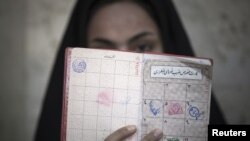A leading U.S.-based rights group is urging Iran to ease restrictions on women in higher education as the country begins its new academic year.
Human Rights Watch said Saturday that Iran has limited the number of college courses available to women.
The group's women's rights director, Liesl Gerntholtz, cited a recent report from Iran's Mehr news agency that said women had been barred from 77 fields.
"Our concerns are that, in some respects, the choices that have been banned for women seem somewhat arbitrary, that some of the majors that women may no longer participate in include computer science, chemical engineering, mechanical engineering," said Gerntholtz.
In a VOA interview, Gerntholtz said the restrictions appear to be part of a broader crackdown on academic freedom in Iran.
"I think this is part of an ongoing process of the Islamization of education," she said.
Gerntholtz said the new guidelines from Iran also indicate that men have been barred from a much smaller number of courses.
In August, Iranian Nobel Peace Laureate Shirin Ebadi voiced concern about academic restrictions on women. In a letter to the United Nations, she said the new rules indicated Iran was unwilling to support the presence of women "in the public arena."
Iranian education officials say foreign media have taken the provisions out of context.
Human Rights Watch said Saturday that Iran has limited the number of college courses available to women.
The group's women's rights director, Liesl Gerntholtz, cited a recent report from Iran's Mehr news agency that said women had been barred from 77 fields.
"Our concerns are that, in some respects, the choices that have been banned for women seem somewhat arbitrary, that some of the majors that women may no longer participate in include computer science, chemical engineering, mechanical engineering," said Gerntholtz.
In a VOA interview, Gerntholtz said the restrictions appear to be part of a broader crackdown on academic freedom in Iran.
"I think this is part of an ongoing process of the Islamization of education," she said.
Gerntholtz said the new guidelines from Iran also indicate that men have been barred from a much smaller number of courses.
In August, Iranian Nobel Peace Laureate Shirin Ebadi voiced concern about academic restrictions on women. In a letter to the United Nations, she said the new rules indicated Iran was unwilling to support the presence of women "in the public arena."
Iranian education officials say foreign media have taken the provisions out of context.





